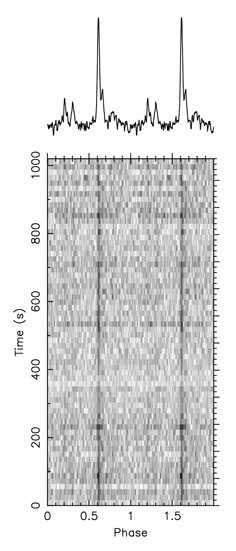
GUPPI First Light observations of PSR B1821-24
On April 17, the team working on the new GBT pulsar backend as part of the CICADA project (Configurable Instrument Collaboration for Agile Data Acquisition) achieved first light with GUPPI (Green Bank Ultimate Pulsar Processing Instrument). GUPPI is based on the open-source FPGA-based technologies developed by the CASPER group at U.C. Berkeley. A large number of NRAO staff members, students, and university collaborators have contributed to GUPPI since it was first proposed at the Green Bank Future Instrumentation Workshop in fall 2006. However, most of the effort has come only in the last 8 months from a smaller team: John Ford (Project Manager), Randy McCullough (Project Engineer), Scott Ransom (Project Scientist), Patrick Brandt, Paul Demorest, Ron DuPlain, Glen Langston, and Jason Ray.
In its first-light configuration, GUPPI already had more time and frequency resolution than the GBT Spigot, and output all four Stokes parameters as well, for a data rate of 190 MB/s! While GUPPI was configured to process 400 MHz of bandwidth via 8-bit sampling, the observations were made with the Green Bank 43-m telescope and an IF that passed only 200 MHz of bandwidth centered at 2 GHz. The target (see Figure) was the "young" 3-ms millisecond pulsar in the globular cluster M28 known as PSR B1821-24 (or M28A). With its large dispersion measure and complex pulse profile, it is a difficult target for conventional filterbank-style pulsar backends, but GUPPI's detection looks fantastic.
Over the next 1-2 months, GUPPI will be used for several expert-user observations in its "Phase I" configuration which will eventually replace the GBT Spigot: 2048 or 4096 channels over 800 MHz of bandwidth with either total intensity or Full Stokes output. Meanwhile, work will continue on GUPPI "Phase II", which will be a wide-bandwidth (500-800 MHz) coherent-dedispersion backend built for high-precision and high-sensitivity pulsar timing observations.
Scott M. Ransom